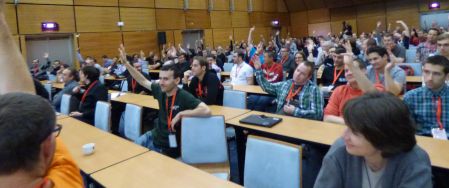Posted by Martijn Grooten on Jul 28, 2017
Today, we are pleased to announce the first two Small Talks for the VB2017 programme.
The 'Small Talks' were first introduced as a third stream at the VB Conference in 2015, and quickly became a popular part of the conference. The talks in this stream are longer than those in the two regular streams and take place in a smaller room, thus creating a more informal atmosphere, ideal for discussion and debate.

In previous years, we've had operating system developers from Microsoft and Google discuss their defences against malware attacks, discussions on important topics such as diversity and attacks on civil society, and we've had organizations such as MAAWG and the Tor Project present their work and its relevance to the security industry as a whole.
In one of this year's Small Talks, Razvan Gavrila from ENISA (the European Union Agency for Network and Information Security) will host a discussion on the lessons learned from the WannaCry outbreak this spring. He will look at topics such as the importance of fact checking, threat information sharing platforms, and the need for actionable IOCs. ENISA is uniquely positioned to be able to build a coherent narrative on what really happened and what lessons can be learned from the outbreak; lessons that will be valuable to many members of the audience.
A second Small Talk will deal with an issue very dear to Virus Bulletin's heart: the testing of security products. Industry veteran and ESET Senior Research Fellow David Harley will first present a paper entitled 'The (testing) world upside down', in which he will look at both the past and the current state of security product testing. This will be followed by an audience discussion led by AMTSO Chief Operating Officer John Hawes.
During the conference, the Small Talks room also serves a second purpose: to host any of the reserve papers that we end up not needing for the main programme.
We have been lucky enough not to have had any cancellations from speakers in the months since we published the VB2017 programme, but we know that the unexpected can, and often does, happen. For this reason, there are no fewer than five reserve papers. These will all be published in the conference proceedings alongside the other papers, and the authors of the reserve papers will be on standby, ready to fill a gap on the main programme should it occur.
However, should we not need to fill any gaps in the main programme, it would be a waste not to see these five research pieces presented at all – therefore, we have set aside some time in the Small Talks room on Thursday and Friday for those that are not needed on the main programme to be presented.
In one of the reserve papers, Bitdefender researchers Cristina Vatamanu, Adrian Schipor and Alexandru Maximciuc will discuss Netrepser, a JavaScript-based targeted attack, while CERT Poland researchers Maciej Kotowicz and Jarosław Jedynak, who delivered a last-minute paper at VB2016, will present a technical paper on contemporary spam botnets.
F-Secure's Jarno Niemelä is also a returning speaker. Together with his colleague Jarkko Turkulainen, he will present a paper on applying the 'record and replay' technique to exploit kits.
Cisco's Angel Villegas will present a paper looking at a new trend: the use of the Go language to write malware. Finally, Qualys's Ankur Tyagi will present a paper on a framework that can help the human eye in 'visually' analysing malware.
More Small Talks will be added to the programme in the coming weeks – and don't forget that the call for 'last-minute' papers, dealing with hot security research, opened this week.
To make sure you don't miss this unique event, register now!